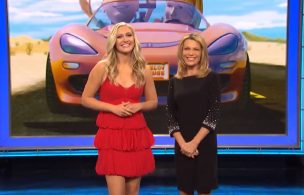| Wheel of Fortune | |
|---|---|
| Created by | Peter Arnell |
| Presented by | Todd Russell |
| Narrated by | Hal Simms |
| Country of origin | United States |
| Production | |
| Running time | |
| Production company(s) | Peter Arnell Productions |
| Release | |
| Original network | CBS |
| Original release | Daytime: October 3, 1952 – December 25, 1953 Primetime: July 7, 1953 – September 15, 1953 |
Wheel of Fortune (and later Million Dollar Wheel of Fortune) Based on the American format of the same name (except the later, with the words 'Million Dollar' in the 2008 Nine Network remake) is one of the most popular and formerly long-running game shows of all time where three contestants spin a wheel and guess letters to solve a 'Hangman'-typed puzzle and win prizes. Since publication two more people won: Autumn Erhard on May 30, 2013, and Sarah Manchester won the third million on September 17, 2014. That's three winners in six years! Fig 1: Million dollar wedge. Michelle Loewenstein became the first-ever Wheel of Fortune millionaire on October 14, 2008—a mere four days after her honeymoon and six weeks after the Million Dollar Wedge was first introduced. Wheel of Fortune (and later Million Dollar Wheel of Fortune) Based on the American format of the same name (except the latter, with the words 'Million Dollar' in the 2008 Nine Network remake) is one of the most popular and formerly long-running game shows of all time where three contestants spin a wheel and guess letters to solve a 'Hangman'-typed puzzle and win prizes.

Wheel of Fortune was an American game show which ran from 1952 to 1953 on CBS in both daytime (October 3, 1952 – December 25, 1953) and nighttime (July 7 – September 15, 1953). It was presented by Todd Russell and narrated by Hal Sims.
Another American game show also titled Wheel of Fortune, that was produced by Merv Griffin and which debuted in 1975, had no connection to the original 1952 game show, although both followed a similar type of format, featuring cash and prizes that could be won by contestants, and both had the same respective logo visible in the center of the wheel.
Gameplay[edit]
The series involved rewarding everyday people who had done good deeds in their life by having their stories told on national TV, then allowing them to spin a carnival-style prize wheel onstage and being awarded that prize. Occasionally, the lucky spin gave the good Samaritan a chance to win up to $1,000 by answering trivia questions.
Theme[edit]
The show's theme was Kay Starr's version of the song 'Wheel of Fortune', which was released in the first two months of 1952 and beginning on February 8 ran 22 weeks on Billboard's best-seller chart, with a nine-week stretch (March 14 to May 9) at #1.

Her version shared the charts with two other renditions during the same period (Bobby Wayne with Joe Reisman's orchestra; the second Eddie Wilcox & Sunny Gale), however the latter two were not as popular. The Wayne/Reisman version appeared from February 15 to April 18 (peaking at #13), while the Wilcox/Gale rendition appeared from February 1 to March 7 (peaking at #14).
Broadcast history[edit]
Wheel debuted on October 3, 1952 at 10:00 AM Eastern (9:00 Central), facing Breakfast Party on NBC and local programming on ABC. In an odd move, the show debuted on a Friday, where the series aired for a full hour until 11:00 AM (10:00 Central) each week; the second half-hour competed against local shows.
On November 24, Breakfast was replaced by the children's program Ding Dong School. On July 6, the Peacock debuted the Henry Babbitt-hosted game Glamour Girl at 10:30, which only competed with the hour-long game on Fridays.
The show's popularity spawned a nighttime version on July 7, 1953 at 8:30 PM, but quickly folded on September 15 against Break the Bank on NBC and local programs elsewhere.
The daytime version fared little better, having been worn down by Glamour and Ding Dong despite the former changing hosts on October 8 from Babbitt to Jack McCoy. Wheel bowed on November 6, 1953, with Glamour following suit on January 8, 1954; Ding Dong remained until the end of 1956.
Australian version[edit]
Despite its short run in America, the show found success in Australia on radio and television from 1959–62.[1] Originally hosted by series producer Reg Grundy, he was replaced by Walter Elliott in 1962.
A similar carnival-style wheel was used in the original 1973 Wheel pilot (Shopper's Bazaar), although that wheel was operated by a motor. A further (and far more explicit) connection arrived in 1981, when Grundy debuted his adaptation of Griffin's Wheel which (like its American counterpart) also had a very long and successful run on the Seven Network until 2006.
A short-lived remake and revival called Million Dollar Wheel of Fortune hosted by Tim Campbell and Kelly Landry ran on the Nine Network for a brief period in 2008. The Million Dollar Wedge concept has been carried over to the original American version since its 26th season debut in the same year.
Episode status[edit]
The American series is believed to be destroyed as per network practices of the era. A photo of Russell and the wheel was used in the A&E Biography TV Game Shows.
The Australian version likely suffered the same fate, although clips of an episode were used in the 2006 special 50 Years: 50 Stars.[2] An episode (missing the opening and closing titles) is held by National Film and Sound Archive as a kinescope recording.[3] The survival rate of Australian game shows of the 1950s and 1960s is highly erratic: although around 13 episodes exist of the short-lived 1957 series Give it a Go, no recordings exist of the popular Melbourne version of Tell the Truth.[3]
References[edit]
- ^'Wheel Of Fortune (AUS) - Australian Game Show Home Page'. iinet.net.au. Archived from the original on 4 March 2016. Retrieved 21 August 2015.
- ^Clip of Grundy's Wheel of FortuneArchived 2016-07-30 at the Wayback Machine
- ^ ab'NFSA - Title Details'. colsearch.nfsa.gov.au. Retrieved 10 February 2018.
External links[edit]
1) In the main game, spin the wheel such that the wheel land exactly on the center 1/3 of the wedge (the outer 1/3's are Bankrupt spaces). I read that there are 24 wedges on the big wheel.
2) Call a letter that is found in the puzzle. (The contestant picks up the wedge at this point.)
3) Solve the puzzle for the round in which he obtains the wedge.
4) Be the Big Winner of the main game. (Without hitting a Bankrupt from the point at which he picks up the wedge)
5) Spin the bonus prize wheel such that the the wheel lands on the $1 million prize. (Which replaces the standard $100,000 prize on the bonus wheel if #1-4 above have been successfully completed.) I read that there are also 24 spaces on the bonus wheel.
6) Solve the bonus puzzle.
The contestants all seem to go gaga about the $1 million wedge if they have a chance to get it, and the host seems to encourage this fervor. However, I am skeptical that the addition of this wedge to the wheel increases the contestants' EV at all. In addition to the long odds of wining the $1 million prize, the addition of the 2 Bankrupt sections makes me think the addition of this wedge (which I believe replaced a dollar amount wedge) is overall bad for the contestants. But I have obviously not done the math.
So my questions are, did the addition of the $1 million wedge increase the EV for the contestants? If so (or even if not!), if the $1 million wedge were replaced by a standard money amount wedge, what would that amount be that would offer the same expected value to the contestants?
Which do you think we should use?
I don't know the answer, but two people have won the $1,000,000.
This is helpful. Does anyone know how many-ish episodes they have had this feature? Further, does anyone have a good guess how many players get to other stages of the process?
Administrator
million
The million dollar wedge premiered on Sept 8, 2008, but
1. it was a full wedge, not a part-bankrupt.
2. it was initially only on the wheel for 1 round.
Administrator
The person holding the wedge must NEVER land on a bankrupt the rest of the game, even after winning the round for the wedge. I think any carryover (such as the wild card and the 1/2 car) is vulnerable to this rule as well, but I don't know that.
Administrator
Wheel Of Fortune
Several contestants have been only one or two pegs away from the $1,000,000 envelope. Two have lost the wedge to a Bankrupt, then lost $100,000 in the Bonus Round, while one won the $100,000 after losing the wedge. Also, one team during a Family Week won the $100,000 after failing to solve the round in which they claimed the wedge.
Wheel Of Fortune Million Dollar Wedge
Cool question. I will give it a try. One thing we should try to establish up front is are we interested in how it effects an average player, or a 'good player.' When I say a 'good player' I mean one who is above average at the game and more likely to be able to solve these puzzles generally and than their opponents.
Which do you think we should use?
Million Dollar Wedge On Wheel Of Fortune Game Answers
Thanks for your interest, endermike. My hypothesis and the reason for my original question is that I think the $1 million wedge reduces the EV for all